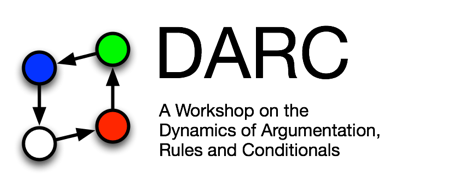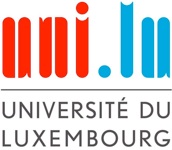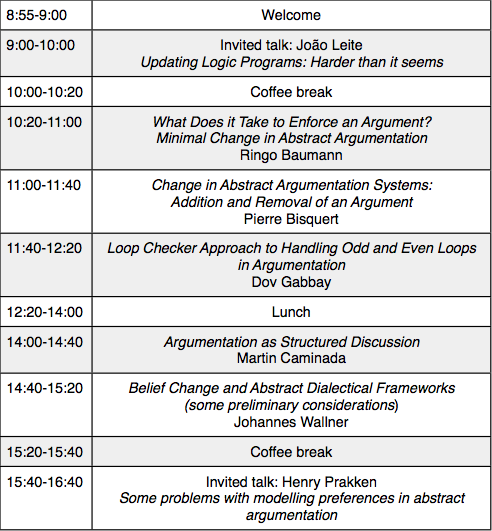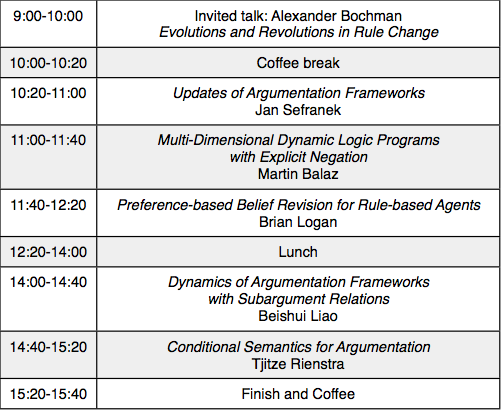Abstracts
Invited Talks
Alexander Bochman (Holon Institute of Technology, Israel)
Evolutions and Revolutions in Rule Change
In this talk we will explore the distinctive role of conditonals (rules) in belief formation and belief change, paying special attention to the differences this special role imposes on potential theories of rule dynamics.
----
João Leite (New University of Lisbon)
Updating Logic Programs: Harder than it May Seem
Over the last decade and a half there has been a considerable effort devoted to the problem of rule updates or, in other words, the problem of characterising the result from bringing up to date a set of rules (logic program) when the world it describes changes. Whereas the state-of-the-art approaches are guided by the same basic intuitions and aspirations as belief updates in the context of Classical Logic, they build upon fundamentally different principles and methods which have prevented a unifying framework that could embrace both belief and rule updates.
In this talk I will overview some of the main results related to rule updates, while pointing out some of the main challenges that research in this topic has faced which make updating a logic program a problem harder to solve than it may seem.
----
Henry Prakken (Utrecht University)
Some problems with modelling preferences in abstract argumentation
(based on joint work with Sanjay Modgil, King's College London)
It is nowadays common to distinguish attack and defeat relations between arguments, where defeat is obtained by resolving attacks with preferences. Since preferences are often added after the arguments have been constructed, the distinction between attack and defeat is very relevant for models of the dynamics of argumentation. In this
talk I will compare the modelling of this use of preferences in abstract and structured argumentation. I will conclude that a proper modelling of preferences requires that the structure of arguments and the way they attack each other is made explicit. I will argue for this claim by comparing two abstract accounts of preferences with the way preferences are modelled in the ASPIC+ framework for structured argumentation.
First I will show that if preference-based abstract argumentation frameworks (PAFs) are instantiated with ASPIC+-style arguments and attacks to generate a defeat relation, then the resulting Dung extensions are not guaranteed to satisfy the rationality postulate of
subargument closure. The problem arises since PAFs cannot model at which points arguments attack each other. I will also show that with ASPIC+'s defeat relation (which takes the way arguments attack each other into account) this problem does not occur.
Then I will compare abstract resolution semantics with a structured version of resolution semantics defined in ASPIC+. It will turn out that several properties that hold for the abstract resolution semantics are not inherited by their ASPIC+ instantiations. The reason for this mismatch is that abstract resolution semantics implicitly makes assumptions that are not shared by all its reasonable instantiations, which questions the generality and significance of abstract resolution semantics.
Contributed Talks
Martin Balaz (Comenius University, Bratislava)
Multi-Dimensional Dynamic Logic Programs with Explicit Negation
There exist many different semantics for multi-dimensional dynamic logic programs. They share some common properties - they are based on the stable model semantics and they satisfy the causal rejection principle.
On the other hand, they differ in the immunity to tautological and cyclic updates, or if they allow to reject by already rejected rules or not.
We will formalize the causal rejection principle, immunity to tautological and cyclic updates for the language of logic programming with explicit negation. We will show that some of the existing semantics can be characterized only in terms of those principles. We will also show what are the consequences of extending the language with explicit negation.
----
Ringo Baumann (Leipzig)
What Does it Take to Enforce an Argument? Minimal Change in Abstract Argumentation
Argumentation is a dynamic process. The enforcing problem in argumentation, i.e. the question whether it is possible to modify a given argumentation framework (AF) in such a way that a desired set of arguments becomes an extension or a subset of an extension,
was first studied in [1] and positively answered under certain conditions. In this paper, we take up this research and study the more general problem of minimal change. That is, in brief, i) is it possible to enforce a desired set of arguments, and if so, ii) what is the minimal number of modifications (additions or removals of attacks) to reach such an enforcement, the so-called characteristic. We show for several Dung semantics that this problem can be decided by local criteria encoded by the so-called value functions. Furthermore, we introduce the corresponding equivalence notions between two AFs which guarantee equal minimal efforts needed to enforce certain subsets, namely minimal-E-equivalence and the more general minimal change equivalence. We present characterization theorems for several Dung semantics and finally, we show the relations to standard and the recently proposed strong equivalence [2] for a whole range of semantics.
[1] R. Baumann and G. Brewka, Expanding argumentation frameworks:
Enforcing and monotonicity results, in COMMA 2010, pp. 75-86,
(2010).
[2] E. Oikarinen and S. Woltran, Characterizing strong equivalence for
argumentation frameworks, Artif. Intell., 1985-2009, (2011).
----
Pierre Bisquert (IRIT, Toulouse)
Change in Abstract Argumentation Systems: Addition and Removal of an Argument
We propose to survey our recent work about change in abstract argumentation. Among the change operations, addition, often viewed as more natural, has already been well studied. Nevertheless, some examples underline the interest of the removal operation. The first aim of this talk is to present our study of this specific kind of change. This study raises a new question in the field of argumentation theory: is there a useable link between addition and removal?
The second aim of this talk is to introduce our work on the impact of this link. For this purpose, we first propose a typology of change properties (conditions that are satisfied by an argumentation system before and after a change operation). Then, we introduce two concepts of duality. These notions of duality are used to obtain new results concerning an operation from existing propositions concerning its dual operation.
----
Martin Caminada (Université du Luxembourg)
Argumentation as Structured Discussion
Natural argumentation often has a dialectical component. When arguing, there is a process going on between two or more participants, in which arguments are exchanged in an orderly manner. Surprisingly, this dynamic, dialectical aspect of argumentation has received very little attention in mainstream Dung-style argumentation theory. We will show, however, that it is perfectly possible to give the mainstream Dung-style argumentation semantics a dialectical foundation. The idea is that acceptance of an argument is determined by the ability to defend it in a structured discussion. Moreover, it turns out that different argumentation semantics (grounded, preferred, stable, ...) correspond to different types of structured discussion (persuasion, Socratic, Socratic with a twist, ...). The advantage of discussion-based interpretations of argumentation theory is that these enable Knowledge-Based Systems to interact with their users in a natural and intuitive way.
----
Dov Gabbay (KCL, London)
Loop Checker Approach to Handling Odd and Even Loops in Argumentation
We offer a uniform way of resolving odd and even loops in argumentation networks by using specialised abductive loop checker techniques. We consider the possibility that the loop checker makes use of the temporal dynamics of the argumentation. We compare with CF2 semantics.
----
Beishui Liao (Zhejiang University, China)
Dynamics of Argumentation Frameworks with Subargument Relations
In an argumentation framework with subargument relations (or briefly, AFwS), the status of arguments is related not only by the attack relations, but also by the subargument relations, among different arguments. So, I'd like to introduce some basic properties of an AFwS, and then, discuss how the status of an AFwS evolves upon the changing of arguments (subarguments) and attacks.
----
Brian Logan (Nottingham)
Preference-based Belief Revision for Rule-based Agents
Agents which perform inferences on the basis of unreliable information need an ability to revise their beliefs if they discover an inconsistency. Such a belief revision algorithm ideally should be rational, should respect any preference ordering over the agent's beliefs (removing less preferred beliefs where possible) and should be fast. However, while standard approaches to rational belief revision for classical reasoners allow preferences to be taken into account, they typically have high complexity. In this talk, I present an approach to belief revision for agents which reason in a simpler logic than full first-order logic, namely rule-based reasoners. I show that it is possible to define a contraction operation for rule-based reasoners, McAllester contraction, that satisfies all the basic Alchourron, Gardenfors and Makinson (AGM) postulates for contraction (apart from the recovery postulate), removes a set of beliefs that is least preferred with respect to a natural interpretation of preference, and at the same time can be computed in polynomial time. McAllester contraction can be used to define a revision operation which is also polynomial time, and I argue that this type of approach is a more appropriate foundation for practical belief revision for agents.
----
Tjitze Rienstra (Université du Luxembourg)
Conditional Semantics for Argumentation
Dung style abstract argumentation theory, centers around two concepts, namely an argumentation framework and an acceptance function, which takes as input an argumentation framework, and returns a set of labelings. A labeling represents a rational evaluation of the arguments, under some set of criteria. This methodology assumes that the evaluation of an argumentation framework is a static and closed process. Given an argumentation framework, there is a fixed set of labelings. No additional considerations play a role in this process. Accordingly, the notions of rationality employed by the semantics work under a type of closed world assumption.
In this paper we introduce a generalized methodology, based on the concept of a conditional acceptance function. The aim is to address the shortcoming just described, and to provide a conceptually richer account of argument evaluation. It generalizes the conventional acceptance in a simple way; instead of taking a framework, and returning a set of labelings, it takes as input both a framework and a set of labelings and selects those that are, in some sense, best.
We generalize the complete, grounded, preferred and stable semantics, and we present an application of our idea, namely a probabilistic semantics that, given probabilities that an agent assigns to the events of particular arguments being attacked by an unknown defeater, calculates the probabilities of skeptical and credulous acceptance of the arguments in the framework
----
Jan Sefranek (Comenius University, Bratislava)
Updates of Argumentation Frameworks
Two main topics are studied in this work. First, updates of argumentation-theoretic frameworks over deductive systems. Second, a problem of an inertia of an admissible set after an update of an abstract argumentation framework.
We consider an assumption-based framework over a logic program as composed of three parts -- an argumentation framework, a deduction machinery and a knowledge base (a logic program). If the logic program is updated, the updates are transferred to the updates of the assumption-based framework.
In the second part an original abstract argumentation framework $AF_o$ and an updating argumentation framework $AF_u$ are assumed. We present a construction testing an inertia of a selected admissible set of $AF_o$, i.e., looking for an admissible set of the updated argumentation framework, which differs minimally from the selected
admissible set.
----
Johannes Wallner (TU Vienna)
Belief Change and Abstract Dialectical Frameworks (some preliminary considerations)
Argumentation is an area at the intersection of Philosophy, Artificial Intelligence (AI) and several application domains. Within AI, formal models of arguments and their relationships, as well as the necessary conflict resolution in the presence of diverging opinions are studied.
The central formal model for argumentation is Dung's widely used argumentation framework (AF) and its associated semantics. AFs capture relationships between arguments with a binary relation denoting an attack between arguments. If the relationship is more complex then auxiliary structures are needed, e.g. for joint attacks, where several attackers are required for a successful attack. Argumentation is naturally situated in an evolving context and hence argumentation systems require revision operations. Revision of relationships may now restructure the aforementioned auxiliary arguments in complex ways. On the abstract level of an AF, auxiliary arguments are indistinguishable from other arguments and thus revision operators require information outside of AFs.
In this talk we will use a generalized framework as our modeling language, namely abstract dialectical frameworks (ADFs). The fundamental idea of ADFs is to treat arguments as atomic entities, yet to allow for much more flexible relationships among arguments by specifying these relations as logical formulae. Relationships between arguments can be encoded completely inside the logical formulae without auxiliary structures. Preferences and proof standards are two examples of important concepts, which can be encoded in compact way in ADFs. Update in an ADF may correspond to just updating acceptance conditions, without manipulating the set of arguments themselves. Complex changes of ADFs typically involve changing the relationship between arguments and hence their formulae in a sophisticated manner. This process may benefit from the rich field of belief revision. This is preliminary work on dynamic changes of ADFs, particularly for removing arguments, e.g. for removing a support. Simply removing the support potentially introduces inconsistent formulae, but this can be repaired by belief change operators situated in the context of contraction.
---











